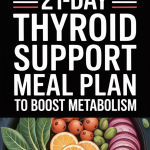Revitalize Your Energy: 21-Day Thyroid Support Meal Plan to Boost Metabolism
Struggling with low energy and sluggish metabolism? You’re not alone. Many people face thyroid issues that can throw their bodies out of balance. A well-structured meal plan can be a game-changer, helping to support thyroid function and rev up your metabolism.
Overview of Thyroid Health
Thyroid health plays a crucial role in regulating metabolism, energy levels, and overall well-being. The thyroid gland produces hormones like thyroxine (T4) and triiodothyronine (T3), which influence metabolic processes throughout the body. An imbalance in these hormones can lead to conditions such as hypothyroidism or hyperthyroidism, resulting in symptoms like fatigue, weight gain, or weight loss.
Understanding the factors that affect thyroid health is essential for maintaining optimal function. These factors include iodine levels, stress, and diet. Iodine is a key nutrient for hormone production. Deficiencies can lead to thyroid enlargement and hormonal imbalances. Stress also impacts thyroid function, as it can alter hormone production and lead to symptoms like fatigue.
A balanced diet specifically tailored for thyroid support can enhance metabolism and improve energy levels. Nutrients such as selenium, zinc, omega-3 fatty acids, and vitamins D and B12 contribute to thyroid hormone synthesis and function. Including foods rich in these nutrients aids in overall thyroid health.
Regular check-ups with healthcare providers help monitor thyroid function, especially if experiencing symptoms related to metabolism and energy levels. Blood tests measuring thyroid-stimulating hormone (TSH), T3, and T4 provide insights into thyroid health, guiding dietary choices and lifestyle adjustments.
Importance of Nutrition for Thyroid Function
Nutrition plays a crucial role in maintaining optimal thyroid function. A balanced diet supports hormone production, regulates metabolism, and enhances overall health. Specific nutrients are vital for proper thyroid health, while certain foods can hinder its function.
Key Nutrients for Thyroid Support
- Iodine: Essential for thyroid hormone synthesis, iodine deficiency can lead to goiter or hypothyroidism. Sources include iodized salt, fish, and dairy products.
- Selenium: This mineral protects the thyroid gland from oxidative stress and aids in the conversion of T4 to T3. Brazil nuts, fish, and eggs provide selenium.
- Zinc: Zinc supports thyroid hormone production and assists in maintaining immune function. Oysters, beef, and pumpkin seeds are excellent sources.
- Vitamin D: Low levels of vitamin D correlate with thyroid dysfunction. Fatty fish, fortified foods, and sunlight exposure promote adequate vitamin D levels.
- Vitamin B12: Critical for energy production and neurological function, vitamin B12 deficiency is common in those with thyroid issues. Meat, dairy, and fortified cereals are rich in B12.
- Omega-3 Fatty Acids: These healthy fats support anti-inflammatory activity, benefitting thyroid health. Sources include fatty fish, flaxseeds, and walnuts.
Foods to Avoid for Thyroid Health
- Goitrogens: Found in cruciferous vegetables like broccoli, cabbage, and kale, goitrogens can interfere with thyroid function when consumed in large quantities. Cooking these vegetables may reduce their goitrogenic effects.
- Soy Products: Soy contains compounds that can hinder thyroid hormone production, especially in people with pre-existing thyroid conditions. Moderation is crucial.
- Gluten: Some studies suggest a link between gluten sensitivity and thyroid issues, particularly in individuals with autoimmune thyroid conditions. Those affected might benefit from gluten-free alternatives.
- Processed Foods: High in refined sugars and unhealthy fats, processed foods contribute to inflammation and may disrupt thyroid function. Prioritize whole foods for better health outcomes.
- Sugar: Excessive sugar intake can lead to weight gain and insulin resistance, negatively impacting metabolism and thyroid function. Reducing added sugars can support thyroid health.
21-Day Meal Plan Structure
A well-structured 21-day meal plan supports thyroid health and boosts metabolism. This plan focuses on nutrient-dense foods while minimizing those that can negatively impact thyroid function.
Weekly Breakdown
- Week 1: Focus on incorporating whole foods. Begin each day with a breakfast rich in protein, such as scrambled eggs with spinach. Include fruits, like berries, for snacks. For lunches, opt for lean proteins combined with leafy greens. Dinner options may consist of grilled chicken with quinoa and steamed broccoli.
- Week 2: Introduce healthy fats. Include foods like avocado and olive oil. Breakfast can feature a smoothie with spinach and almond milk. Snacks may include nuts or seeds. Lunch can transition to salmon with asparagus. Aim for dinners that incorporate legumes, like chickpeas, in vegetable stir-fries.
- Week 3: Emphasize complex carbohydrates. Start each morning with oatmeal topped with walnuts. Choose snacks like hummus with carrot sticks. Include brown rice or sweet potatoes in lunch meals alongside turkey. For dinner, consider lean beef with roasted vegetables.
Meal Prep Tips
- Plan Ahead: Set aside time each week to plan meals. Create a grocery list to minimize shopping time.
- Batch Cooking: Prepare large portions of grains and proteins. Store them in the fridge for easy access during the week.
- Storage Containers: Use clear, labeled containers for portion control. Glass containers are ideal for reheating food safely.
- Utilize Freezer Space: Freeze leftovers or excess portions. This way, I can enjoy ready-made meals without the hassle of cooking every day.
- Variety is Key: Rotate ingredients to maintain interest in meals. Change up vegetables, proteins, and grains while keeping within nutritional guidelines.

Sample Recipes
Here are some sample recipes that align with the 21-day thyroid support meal plan, focusing on nutrient-dense ingredients that boost metabolism.
Breakfast Ideas
- Spinach and Feta Omelette: Whisk two eggs, sauté fresh spinach until wilted, and add crumbled feta cheese. Cook until eggs are set. This dish provides protein and iron, supporting thyroid function.
- Overnight Oats: Combine rolled oats, almond milk, chia seeds, and a dash of maple syrup in a jar. Top with sliced bananas and walnuts. Overnight oats offer complex carbohydrates and omega-3 fatty acids for sustained energy.
- Avocado Toast: Mash one ripe avocado on whole-grain toast. Sprinkle with sea salt, pepper, and chili flakes for flavor. This meal delivers healthy fats and fiber for metabolic support.
Lunch and Dinner Options
- Grilled Salmon Salad: Grill a 4-ounce salmon fillet, serve over mixed greens, cherry tomatoes, and cucumber. Drizzle with olive oil and lemon juice. Salmon is rich in omega-3 fatty acids, crucial for thyroid health.
- Quinoa Bowl: Cook quinoa and combine it with black beans, diced bell peppers, corn, and cilantro. Add a lime vinaigrette for flavor. This bowl provides plant-based protein and complex carbs, promoting optimal energy levels.
- Roasted Chicken with Vegetables: Roast skinless chicken breast with a mix of broccoli, carrots, and sweet potatoes. Season with herbs like rosemary and thyme. This meal offers lean protein and various vitamins and minerals.
Snacks and Desserts
- Greek Yogurt with Berries: Portion out one cup of plain Greek yogurt and top with fresh strawberries and blueberries. Drizzle with honey for sweetness. This snack supplies protein and antioxidants that support metabolism.
- Nut and Seed Trail Mix: Combine almonds, walnuts, pumpkin seeds, and dried cranberries. Keep a portion of ¼ cup handy for an energy boost. Nuts and seeds provide healthy fats, fiber, and essential nutrients.
- Chia Pudding: Mix ¼ cup chia seeds with one cup almond milk and a tablespoon of maple syrup. Let it sit in the fridge overnight, then top with sliced almonds. Chia seeds are high in omega-3s, promoting thyroid health.
Lifestyle Tips for Metabolism Boost
Incorporating specific lifestyle changes complements the 21-day thyroid support meal plan and maximizes metabolism boost. Consider these actionable tips for an effective approach.
Exercise Recommendations
Incorporating regular exercise enhances metabolism and supports thyroid function. Aim for 150 minutes of moderate aerobic activity weekly. Choose activities such as:
- Walking: Choose brisk walking to improve cardiovascular fitness.
- Strength Training: Include weight lifting at least twice a week to build muscle and increase resting metabolic rate.
- High-Intensity Interval Training (HIIT): Integrate short bursts of intense exercise lasting 20-30 minutes to maximize calorie burn.
Research shows that consistent exercise positively influences thyroid hormone levels, bolstering energy levels and metabolism.
Stress Management Techniques
Managing stress plays a crucial role in maintaining thyroid health and optimizing metabolism. Implement these techniques:
- Mindfulness Meditation: Practice for 10-20 minutes daily to reduce cortisol levels and enhance well-being.
- Yoga: Participate in yoga sessions to promote relaxation and physical activity simultaneously.
- Deep Breathing Exercises: Utilize this method throughout the day to alleviate tension and improve focus.
Studies indicate that lower stress levels correlate with improved thyroid function and better metabolic rates. Incorporating mindfulness practices and physical activities can yield significant results in hormone regulation.
Conclusion
Embracing a 21-day thyroid support meal plan can truly transform your approach to health and well-being. By focusing on nutrient-dense foods that nourish your thyroid and boost metabolism, you’re setting the stage for increased energy and improved overall health.
I’ve found that incorporating a variety of wholesome ingredients not only enhances thyroid function but also makes meals enjoyable. With the right balance of proteins healthy fats and complex carbohydrates you can support your body’s needs effectively.
Remember that consistent lifestyle habits like regular exercise and stress management are equally vital. By committing to this holistic approach you’re taking significant steps toward revitalizing your metabolism and enhancing your quality of life.




